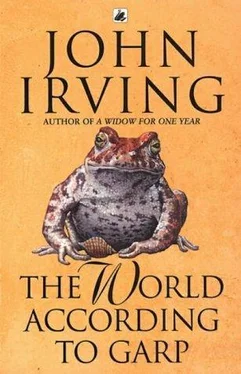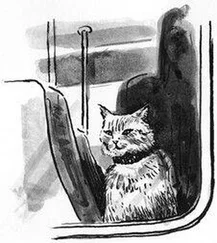If Harrison Fletcher had still been her colleague, she would have shown him the questionnaire. Regardless—whoever Michael Milton was, even if he was that disturbing-looking boy—she would have brought up the matter with Harrison. Harrison and Helen, in the past, had some secrets of this kind, which they kept from Garp and Alice; they were permanent but innocent secrets. Helen knew that sharing Michael Milton's interest in her with Harrison would have been another way to avoid any actual connection.
But she did not mention Michael Milton to Garp, and Harrison, of course, had left to seek his tenure elsewhere. The handwriting on the questionnaire was black, eighteenth-century calligraphy, the kind that can only be carved with a special pen; Michael Milton's written message looked more permanent than print, and Helen read it over and over again. She noted the other answers to the questionnaire: date of birth, years in school, previous courses in the Department of English or in comparative literature. She checked his transcript; his grades were good. She called two colleagues who'd had Michael Milton in courses last semester; she derived from them both that Michael Milton was a good student, aggressive and proud to the point of being vain. She gathered from both her colleagues, though they did not actually say so, that Michael Milton was both gifted and unlikable. She thought of the deliberately unbuttoned buttons on his shirt (she was sure, now, that it was he) and she imagined buttoning them up. She thought of that wispy mustache, a thin trace upon his lip. Garp would later comment on Michael Milton's mustache, saying that it was an insult to the world of hair and to the world of lips; Garp thought it was so much the merest imitation of a mustache that Michael Milton would do his face a favor to shave it off.
But Helen liked the strange little mustache on the lip of Michael Milton.
“You just don't like any mustaches,” Helen said to Garp.
“I don't like that mustache,” he said. “I've got nothing against mustaches, in general,” Garp insisted, though in truth Helen was right: Garp hated all mustaches, ever since his encounter with the Mustache Kid. The Mustache Kid had spoiled mustaches for Garp, forever.
Helen also liked the length of Michael Milton's sideburns, curly and blondish; Garp's sideburns were cropped level to his dark eyes, almost at the tops of his ears—although his hair was thick and shaggy, and always just long enough to cover the ear that Bonkers ate.
Helen also noticed that her husband's eccentricities were beginning to bother her. Perhaps she just noticed them more, now that he was so fitfully involved in his writing slump; when he was writing, perhaps he had less time to devote to his eccentricities? Whatever the reason, she found them irksome. His driveway trick, for example, infuriated her; it was even contradictory. For someone who fussed and worried so much about the safety of the children—about reckless drivers, about leaking gas, and so forth—Garp had a way of entering their driveway and garage, after dark, that terrified Helen.
The driveway turned sharply uphill off a long downhill road. When Garp knew the children were in bed, asleep, he would cut the engine and the lights and coast up the black driveway; he would gather enough momentum from leaving the downhill road to roll over the lip at the top of the driveway and down into their dark garage. He said he did it so that the engine and the headlights would not wake up the children. But he had to start the car to turn it around to drive the baby-sitter home, anyway; Helen said his trick was simply for a thrill—it was puerile and dangerous. He was always running over toys left in the blackened driveway, and crashing into bicycles not moved far enough to the rear of the garage.
Once a baby-sitter had complained to Helen that she hated coasting down the driveway with the engine and the headlights out ( another trick: he would pop the clutch and snap on the lights just before they reached the road).
Am I the one who's restless? Helen wondered. She had not thought of herself as restless until she thought of Garp's restlessness. And for how long had she really been irritated by Garp's routines and habits? She didn't know. She only knew that she noticed she was irritated by them almost from the moment she read Michael Milton's questionnaire.
Helen was driving to her office, wondering what she would say to the rude and conceited boy, when the gear knob of the Volvo's stick shift came off in her hand—the exposed shaft scratched her wrist. She swore as she pulled the car over and examined the damage to herself and to the gearshift.
The knob had been falling off for weeks, the screw threads were stripped, and Garp had several times attempted to make the knob stay on the stick-shift shaft with tape. Helen had complained about this half-assed method of repair, but Garp never claimed to be handy and the care of the car was one of Helen's domestic responsibilities.
This division of labor, though largely agreed upon, was sometimes confusing. Although Garp was the home maker among them, Helen did the ironing ("because,” Garp said, “it's you who cares about pressed clothes"), and Helen got the car serviced ("because,” Garp said, “you're the one who drives it every day; you know best when something has to be fixed"). Helen accepted the ironing, but she felt that Garp should deal with the car. She did not like accepting a ride in the service truck from the garage to her office—sitting in the greasy cab with some young mechanic who paid less than adequate attention to his driving. The garage where the car was fixed was a friendly enough place to Helen, but she resented having to be there at all; and the comedy of who would drive her to work after she dropped off the car had finally worn thin. “Who's free to take Mrs. Garp to the university?” the boss mechanic would cry into the dank and oily darkness of the vehicle pits. And three or four boys, eager but begrimed, would drop their wrenches and their needle-nosed pliers, would lug and heave themselves out of the pits, would bolt forward and volunteer to share—for a brief, heady moment—that tight cab aclank with auto parts, which would take the slender Professor Garp to work.
Garp pointed out to Helen that when he took the car, the volunteers were slow to appear; he frequently waited in the garage for an hour, finally coaxing some laggard to drive him home. His morning's work thus shot, he decided the Volvo was Helen's chore.
They had both procrastinated about the gearshift knob. “If you just call to order a new one,” Helen told him, “I'll drive there and let them screw it on while I wait. But I don't want to leave the car for a day while they fart around trying to fix this one.” She had tossed the knob to him, but he'd carried it out to the car and had taped it, precariously, back on the shaft.
Somehow, she thought, it always fell off when she was driving; but, of course, she drove the car more than he did.
“Damn,” she said, and drove to her office with the ugly gearshift uncovered. It hurt her hand every time she had to shift the car, and her scratched wrist bled a little on the fresh skirt of her suit. She parked the car and carried the gear knob with her, across the parking lot, toward her office building. She contemplated throwing it down a storm sewer, but it had little numbers printed on it; in her office she could call the garage and tell them what the little numbers were. Then she could throw it away, wherever she liked; or, she thought, I can mail it to Garp.
It was in this mood, beset with trivia, that Helen encountered the smug young man slouched in the hall by her office door with the top two buttons of his nice shirt unbuttoned. The shoulders of his tweed jacket were, she noticed, slightly padded; his hair was a bit too lank, and too long, and one end of his mustache—as thin as a knife—drooped too far down at the corner of his mouth. She was not sure if she wanted to love this young man or groom him.
Читать дальше












